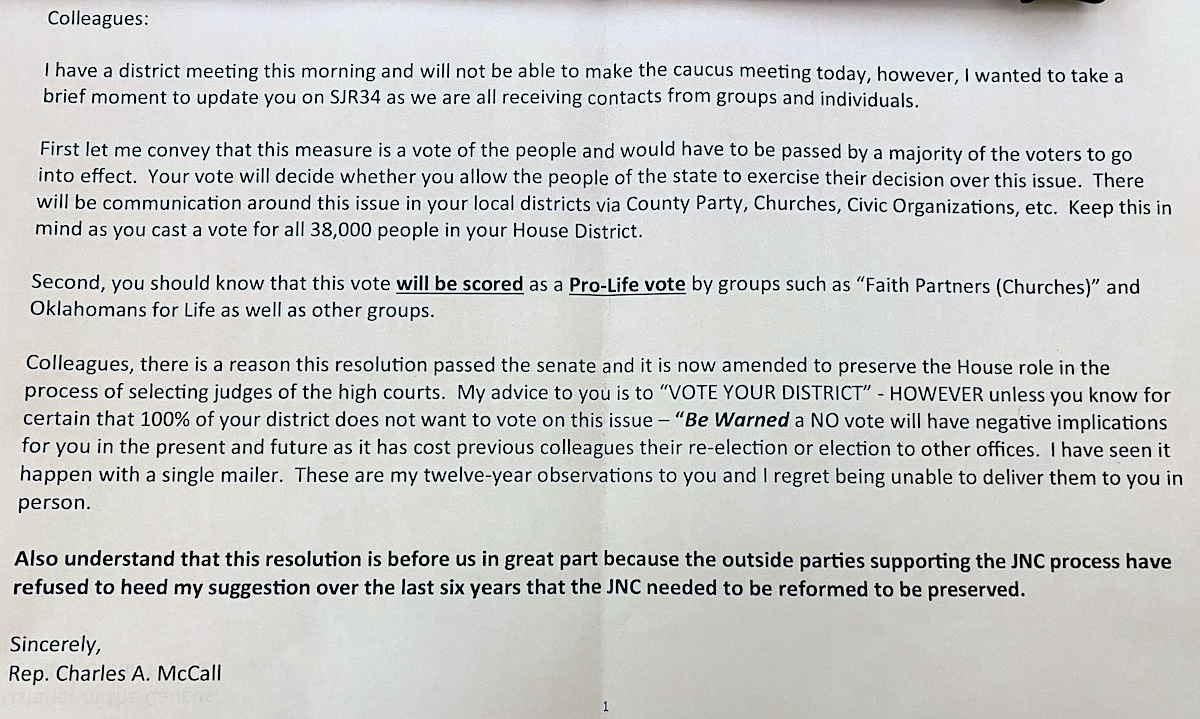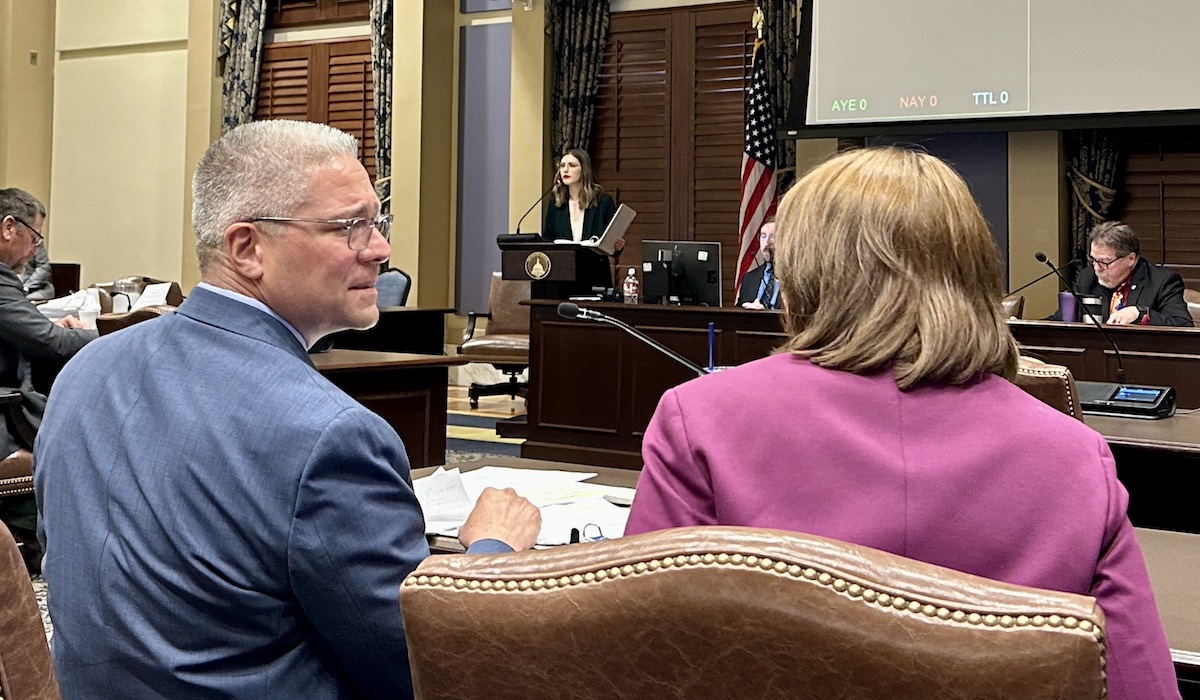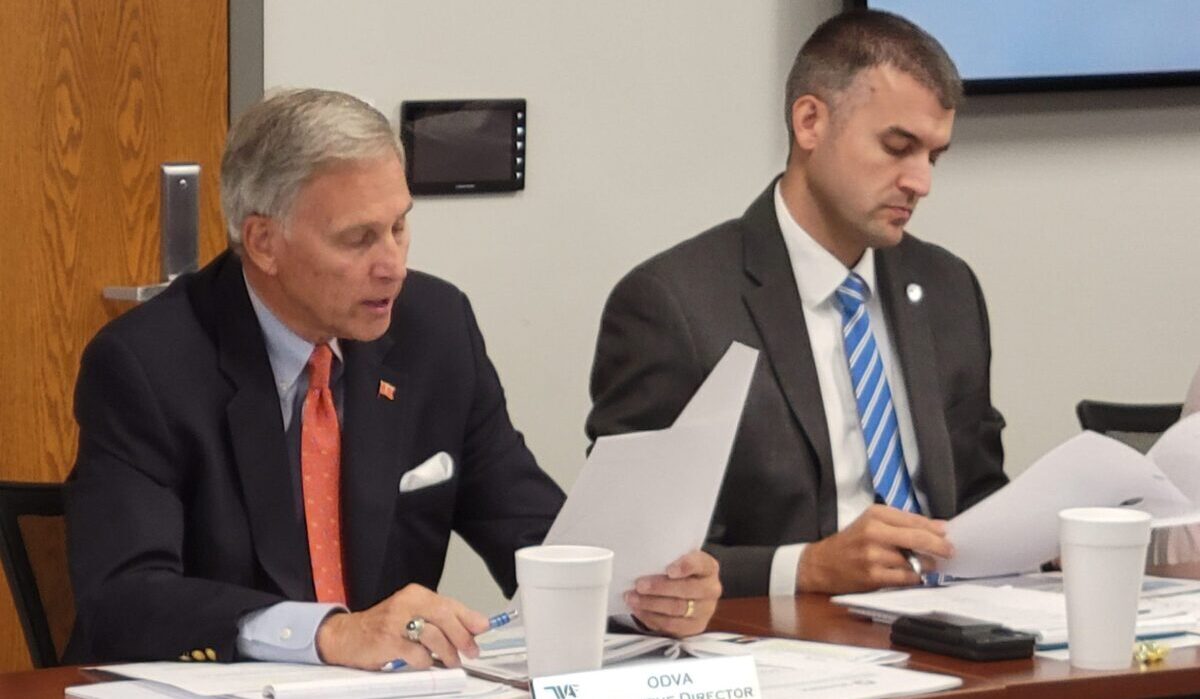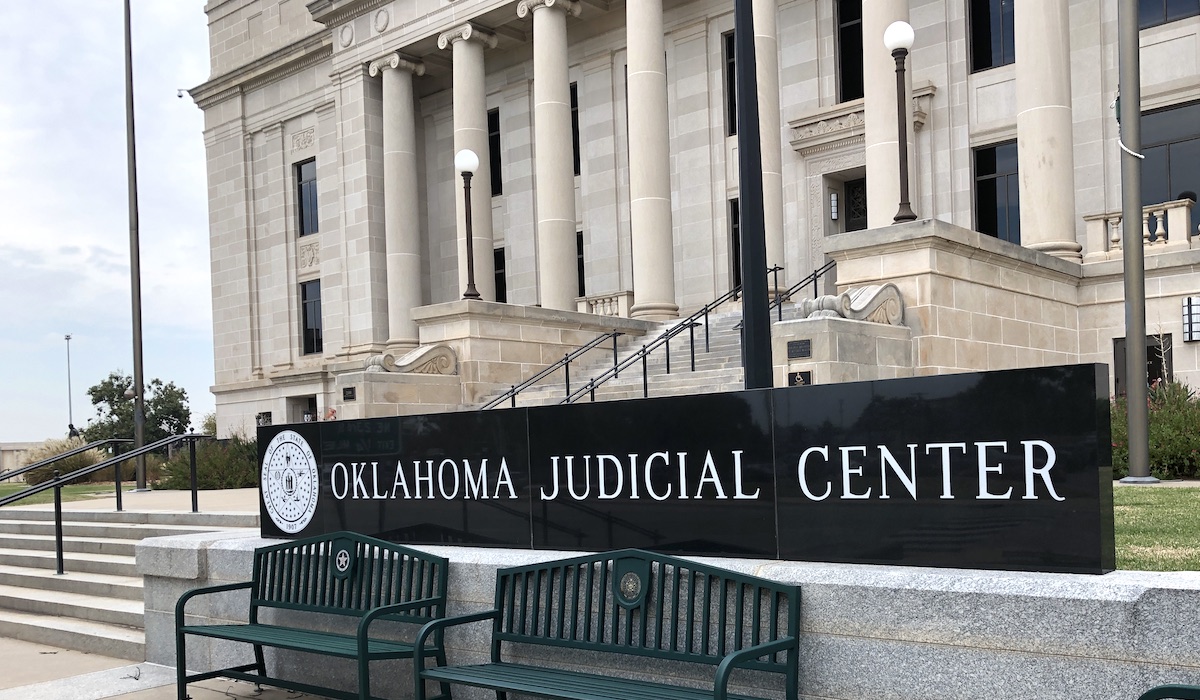
The Oklahoma Department of Veterans Affairs needs a new director, the state Supreme Court has upheld the dismissal of a massive education funding lawsuit, and in a development that should shock no one, patients trust their doctors more than their insurance companies, according to a poll released by the Oklahoma State Medical Association.
Beyond those news nuggets, events at the Oklahoma Legislature have heated up, with a pair of notable proposals failing recently.
Here’s a look at those stories and more items that readers might have missed over the last two weeks.
Despite McCall’s warning to caucus, SJR 34 fails 36-60

Tuesday morning after announcing his House Republican Caucus’ budget position, Speaker Charles McCall prepared to watch the consideration of Senate Joint Resolution 34 on the House floor. The measure would ask voters whether to scrap the Judicial Nominating Commission in favor of a direct gubernatorial appointment and legislative confirmation process for Oklahoma appellate court judges.
“I have advocated for JNC reform for six years now, which has fallen on deaf ears to the outside groups,” McCall said. “The Senate has sent this measure over. This is an opportunity for the House to amend that bill and keep the House in that process and let the voters of the state of Oklahoma decide this.”
With McCall leading his final regular session and pondering a potential 2026 run for governor, SJR 34 has presented itself as a prickly political football. Unhappy with Oklahoma Supreme Court rulings on abortion and other matters, conservative groups have pushed JNC reform — or elimination — for years. Attorney groups, on the other hand, have argued that the JNC’s origins after a 1960s Supreme Court bribery scandal underscore the importance of having the private commission vet and recommend to the governor applicants for judicial positions.
On Monday morning, McCall notified House Republicans he would not be in caucus that day, which also featured dozens of attorneys at the Capitol advocating against SJR 34. Instead of presenting in caucus, McCall sent an email telling House Republicans they needed to understand the potential ramifications of their SJR 34 vote.
“There will be communication around this issue in your local districts via county party, churches, civic organizations, etc. Keep this in mind as you cast a vote for all 38,000 people in your House district,” McCall wrote, emphasizing his next point with underlines and bolding. “Second, you should know that this vote will be scored as a pro-life vote by groups such as ‘Faith Partners (Churches)’ and Oklahomans for Life as well as other groups.”
McCall advised his colleagues in all capital letters: “VOTE YOUR DISTRICT.”
“HOWEVER unless you know for certain that 100% of your district does not want to vote on this issue — ‘Be Warned a NO vote will have negative implications for you in the present and future as it has cost previous colleagues their reelection or election to other offices,” McCall wrote. “I have seen it happen with a single mailer. These are my 12-year observations to you and I regret being unable to deliver them to you in person.”
Many Republican House members were ultimately unswayed, with the stern nature of McCall’s advice raising eyebrows.
“It pissed a lot of people off,” one legislator said on the condition of anonymity. “It aggravated a lot of members.”
When the resolution came up for a vote Tuesday morning, it failed by a 36-60 vote, with less than half of the House GOP Caucus going green on the board.
House Civil Judiciary Committee Chairman Chris Kannady voted against the bill and said afterward that support lagged owing to “questions of why we were doing this and what the effects were going to be.”
“We run a version of that bill every year, and it’s just not popular. The JNC was created to solve problems, and it’s done that for 60 years,” said Kannady (R-OKC). “There was some confusion about if you do this, it only affects the appellate judges. So then what do you do with the district judges when you have vacancies? There are several of those every year.”
Because the measure was captured by its House author — Rep. Mark Lepak (R-Claremore) — it could be recalled for further consideration. Rumors spread Tuesday afternoon that McCall was already asking members to change their minds and vote for SJR 34 if it is brought back up, but he denied the claim.
“No, no, no. I’m aware that the bill author captured the bill for potential reconsideration, but it will not go up unless 51 Republican members of the House come to my office and say they want to hear it again,” McCall said. “I have not reached out to anybody.”
McCall reiterated comments he had made shortly before Tuesday’s vote: that the JNC should have been reformed in years past to provide more transparency and stronger oversight from legislative appointees. He also expressed concern that, although Republicans dominate statewide elected office and hold supermajorities in both legislative chambers, the state’s political party preferences are not reflected on the JNC.
“I think at some point in time, the current process is going to have to change a little, or there will continue to be more and more pressure for a new mechanism like this to be considered,” McCall said.
Kannady said the idea of reforming JNC parameters and procedures has more merit than strict elimination.
“We have tweaked it before, and I think it could use some tweaks,” Kannady said. “Everything can be modernized. I don’t think you just go with the nuclear option and get rid of it.”
Asked Tuesday about the potential for conservative groups — such as the Oklahoma Council for Public Affairs — to campaign against House members who voted down SJR 34, McCall took a different tone than he set in his Monday email to legislators.
“I’ve not had any conversations with anybody on that,” McCall said. “Campaigns are campaigns. The political process is the political process. I think every time we put a vote on the board, there’s going to be somebody in your district that likes it and those that don’t.
“The resolution has run its course in the House, it appears.”
Bill to collect toll payments from unidentifiable tags fails

A bill that would allow the Department of Public Safety to send the Oklahoma Turnpike Authority information within the Oklahoma Law Enforcement Telecommunications System to collect unpaid toll payments from unidentifiable tags failed in the House Public Safety Committee on April 9 by a 2-6 vote, despite having its title struck.
Rep. Carl Newton (R-Cherokee), the House author on Senate Bill 1907, said the inability to identify some tribal tags with the PlatePay system has led to the state missing out on about $11 million annually in turnpike revenue.
“[DPS] would be allowed to let OLETS release only the owner’s name and address [registered] to that tag. The stream cannot go the other way,” Newton said. “[OTA] cannot ask for a revised address. They cannot ask for the driver. That information is confidential and will not be released. It’s only the tag who the car is registered to.”
Asked by committee members whether releasing names and addresses registered with tribal tags from OLETS would violate state-tribal vehicle registration compacts, Newton was unsure. Other committee members expressed concern about releasing information from OLETS.
Newton said the measure would allow the names and addresses registered with tribal tags from 24 tribes to be disseminated from OLETS to the OTA.
“Are we violating any agreements that are currently in place with any of our tribal compacts by passing this law?” asked Rep. John Kane (R-Collinsville).
Newton said Oklahoma Attorney General Gentner Drummond’s “unofficial opinion” is that if the measure were passed, it would not be in violation of any law.
“I realize we can pass a law and it’d be legal, but (…) in the existing compacts, did we say we wouldn’t do this?” Kane asked.
Newton told committee members the measure was not an attempt to circumvent the state’s agreements with individual tribes.
“I think this is not changing or trying to go around the compact. I think we’re trying to find a short-term solution because we’re losing millions and millions of dollars on the turnpike,” Newton said.
On Friday, Gov. Kevin Stitt told media that state statute says “all traffic” must pay turnpike tolls in Oklahoma. He called SB 1907’s failure a “shocker.”
“When you drive on our turnpike system, call me crazy, but everybody should pay the same amount,” Stitt said. “We’re breaking the law by allowing vehicles to run up and down the turnpike without collecting [tolls]. I don’t know why everybody is not outraged by this.”
The Cherokee Nation is the largest tribe in Oklahoma with a tag system that is unidentifiable by the state’s turnpike toll readers. Cherokee Nation Attorney General Chad Harsha blamed state agency leaders for the disconnect.
“At no time representatives from Oklahoma DPS or Service Oklahoma contacted the Cherokee Nation with concerns about Cherokee Nation car tags as it transitioned to a new PlatePay system,” Harsha said “The Cherokee Nation has always been dedicated to collaboration and solutions with our state partners, rather than conflict.”
Senate Democrats question OSDE’s rule-making authority

In a 90-minute meeting Monday that grew tense at times, members of the Senate Administrative Rules Committee questioned an Oklahoma State Department of Education representative about the department and board’s rule-making authority. A future meeting is expected to feature votes on numerous proposed education rules.
Coming primarily from Democrats who sit on the committee, the questions focused on whether OSDE and the State Board of Education have rule-making authority without a specific directive from the Legislature. Committee members relied heavily on Attorney General Gentner Drummond’s March 2023 opinion declaring that OSDE lacked the authority to promulgate previous rules.
Although committee members took no votes Monday, the meeting sets up another possible fight in the Legislature regarding OSDE rules. To take permanent effect, all agency rules must be approved in a convoluted process that allows approval by the Legislature and/or the governor. With the questions surrounding OSDE’s authority to promulgate rules not specifically connected to new laws, it is unclear whether the Legislature will allow the new rules to become permanent. Last year, after similar questions were raised regarding new education rules, lawmakers declined to affirm or reject them, allowing Gov. Kevin Stitt to approve the proposals himself.
“The concern on this one is that there is no explicit authorization to promulgate rules,” Sen. Michael Brooks (D-OKC) said at the beginning of the meeting.
OSDE’s representative, government affairs associate Lindsey McSparrin, at times cited statutes listed on an information sheet purportedly giving the agency authority for the rules. At other times, she insisted that amending existing rules did not require a specific directive from the Legislature.
McSparrin was unable to answer many questions, prompting acting Chairman Michael Bergstrom (R-Adair) to ask McSparrin to compile a report with requested information to give to committee members.
The exchanges between the Democrats and McSparrin grew tense. Rather than answer a question from Brooks at one point, McSparrin responded with one of her own.
“Does the Legislature have to change the law for us to change the rule?” McSparrin asked.
Brooks and Sen. Mary Boren (D-Norman) also wondered throughout the meeting why McSparrin had appeared before them rather than someone from OSDE with the legal knowledge to discuss the Oklahoma Constitution and statutes concerning education.
“I don’t have a question for the presenter. I think they’re not qualified to answer it. My question needs legal interpretation,” Boren said. “I’m assuming that because the person isn’t an attorney, they’re not able to interpret that, so my question just remains unanswered for today.”
After the meeting, Brooks said he felt OSDE was overstepping its rule-making authority.
“I feel bad for the person that they sent to have to run this gauntlet of questions, especially (given) the fact that — currently, as I understand it — there’s not an attorney working full time at the State Board of Education,” Brooks said.
Although the State Board of Education does have its own attorney, OSDE lacks a current full-time attorney. Instead, Jason Reese, the former general counsel for Gov. Kevin Stitt, has been contracted to represent the agency.
State Superintendent of Public Instruction Ryan Walters sent out a statement after the meeting. He doubled down on his usual criticisms of Democrats, saying they promote pornography and indoctrination.
“Democrats took aim at the Oklahoma Constitution, well-established precedent, and the clear will of Oklahomans today,” Walters said. “Democrats will stop at nothing to try to regain control of our kids’ education, and on behalf of Oklahoma students, our families in Oklahoma will never give in to their demands.”
Bill creating Affordable Housing Commission advances

The Senate’s Business and Commerce Committee advanced a measure to create an Affordable Housing Commission to oversee strategic planning to combat growing housing shortages in the state. The bill is authored by Sen. Julia Kirt (D-OKC) and Rep. Meloyde Blancett (D-Tulsa).
If passed into law, House Bill 2724 would create a 15-member commission with members appointed by Senate and House leadership and the governor. It would include representatives from both political parties and experts in the field from rural and urban communities as well as tribal nations.
“Housing is essential to economic growth. As our state continues to focus on workforce development to help existing businesses expand and bring new businesses to Oklahoma, affordable housing must be prioritized,” Kirt said in a statement “Everyone needs a home, and affordable housing and economic stability go hand in hand. Developing a comprehensive policy that empowers more Oklahomans to own a home is ultimately good for our entire state. That’s what this legislation will help us achieve.”
HB 2724 would also direct the Oklahoma Housing Finance Agency to promulgate rules to implement a comprehensive affordable housing analysis and needs assessment, create an annual report and action plan, and develop “a plan for long-term expansion of affordable housing across the state.”
The bill now awaits consideration by the full Senate. Its title was stricken in the House, meaning senators would have to vote to restore the title, triggering further consideration back in the House where it passed with only 52 votes.
OKC Key to Home program houses 21 more people

An additional 21 unhoused people and 19 pets living near Southwest 25th Street and Pennsylvania Avenue in Oklahoma City have found housing through the city’s Key to Home program, which aims to house 500 of the most chronically homeless people by the end of 2025.
City officials announced the new program participants April 11. Since September, the program has found housing for 126 people living on the streets, which equates to 25 percent of the program’s goal.
“We are excited about the work of Key to Home because addressing the root cause, housing gives people the opportunity to stabilize and ensure their experience with homelessness is brief and time,” said Jamie Caves, Key to Home’s partnership strategy implementation manager. “As we hit 25 percent of our goal, we want to celebrate the service partners that have come together to make this happen. We’ve asked them to collaborate in new and innovative ways, and they’ve risen to the challenge.”
ODVA executive director Slavonic to leave agency

Greg Slavonic, who righted the ship for the Oklahoma Department of Veterans Affairs when the agency faced turmoil a year ago, is stepping down as director
A retired Navy rear admiral and former undersecretary of the U.S. Navy, Slavonic was named interim executive director of ODVA in March 2023 and executive director six months later. He announced April 9 that his planned departure from ODVA will be effective May 31.
Slavonic took over the helm of ODVA during a tumultuous time, when the previous director, Joel Kintsel, had refused to attend meetings of the Oklahoma Veterans Commission. He had said three members of the commission were improperly appointed by Gov. Kevin Stitt, whom Kintsel unsuccessfully challenged in the June 2022 Republican primary for governor.
Minutes after terminating Kintsel in March 2023, the Veterans Commission hired Slavonic, who originally anticipated serving for six months but decided to stay longer to improve the organizational climate and reduce ODVA’s reliance on contract personnel.
During Slavonic’s tenure, he oversaw the closure of the Talihina Veterans Home, a 102-year-old facility, which was causing the agency to lose $500,000 a month owing to low occupancy and high contract employee costs.
A new nursing and residential veterans home being built in Sallisaw will eventually replace the Talihina Veterans Home and add bed capacity to the ODVA’s system. Originally, the new facility had been proposed to open in July, but construction delays, subsequent cost overruns and complications with an architect pushed back completion to late this year.
Slavonic last year worked with lawmakers to get legislative approval of about $22 million in one-time funding for the Sallisaw construction project.
Slavonic, during his tenure, also improved morale among the agency’s approximately 1,400 employees.
“This collective of ODVA personnel has demonstrated an unwavering commitment to the welfare of Oklahoma’s veterans, ensuring they receive the highest standard of care available,” Slavonic said in his formal resignation April 8 to the Oklahoma Veterans Commission. “I take immense pride in the collective achievements of the ODVA team during my 14-month stewardship as executive director. Despite unforeseen challenges, we have worked tirelessly to cultivate a robust leadership cadre capable of perpetuating our mission.”
Robert Allen, chairman of the Veterans Commission, praised Slavonic in a press release.
“I can’t express enough my gratitude for Greg’s service to our agency over the last year and his willing to selflessly jump into action during such a tumultuous time,” Allen said.
Allen said the search for a new executive director will commence soon. However, the commission has only met once so far this year amid lingering turmoil over the issue Kintsel raised regarding gubernatorial appointment of commissioners. Only five members are currently seated on the commission, and although three bills were filed this year to modify appointment requirements, only one has advanced past the most recent deadline: Senate Bill 1384, which would retain future appointment recommendations from veterans groups but would allow the governor to appoint from members of his or her choosing for vacant terms.
Supreme Court affirms dismissal of #oklaed payment issue

On April 2, the Oklahoma Supreme Court released a ruling affirming that a group of public school districts lacked standing in a 2016 case against the state treasurer and State Department of Education wherein they alleged they had been underpaid for years.
Upholding an earlier Oklahoma County District Court ruling, justices wrote that although the districts might have been underpaid from 2004 to 2014 and another group of districts may have been overpaid during the same period, the fact that more than 30 months had passed since the appropriations lapsed when they filed the action meant that the districts no longer had legal grounds for the case. Essentially, the districts’ statute of limitations to bring the action had run out.
“This court directed appellant school districts to present facts and legal authority to demonstrate the state aid funds they sought are based on appropriations of state aid that have not lapsed,” Justice James Winchester wrote in the 8-0 majority opinion. “They failed to meet this burden.”
The school districts of Mid-Del, Enid, Ponca City and Oklahoma City brought the suit in 2016 alleging that a miscalculation of state aid by the treasurer resulted in their districts being underpaid for a decade. Western Heights Public Schools later filed its own case alleging the same thing, which was consolidated with the first case.
Although the districts initially brought the case against OSDE and the state treasurer, the overpaid districts later joined the suit as intervenors owing to the plaintiffs’ request that OSDE recoup the overpayments to give to the underpaid districts.
The intervening districts were Tulsa, Sand Springs, Broken Arrow, Bixby, Jenks, Union and Owasso.
In a confusing series of legal proceedings and appeals, the Supreme Court eventually said in 2020 that the school districts would need to conduct an audit to prove the validity of their claims. The State Board of Education requested the state auditor and inspector to conduct an audit in November 2022 for that purpose.
But before the audit was completed, the Supreme Court took the case up again to adjudicate “the issue of their standing to judicially compel legislative appropriations.”
With the court’s April 2 ruling, the matter would appear to be settled because the court found that even if a forensic audit did show misappropriations, the 30-month deadline had already passed when the school district plaintiffs filed the case.
Terence Crutcher estate’s claims against Betty Shelby dismissed
Nearly seven years after Terence Crutcher was fatally shot by Tulsa Police officer Betty Shelby, Judge Eric Melgren dismissed a civil suit filed against Shelby and the City of Tulsa related to Crutcher’s death.
Melgren normally sits in the U.S. District Court for the District of Kansas but heard the case owing to a shortage of judges in the Northern District of Oklahoma. While the dismissal of claims against Shelby is final unless appealed, the federal judge left open the door open for Crutcher’s estate to pursue litigation against the City of Tulsa in state court.
Crutcher, a Black man, was shot and killed Sept. 16, 2016, in Tulsa by Shelby, a white police officer. At the same time Shelby fired her handgun, another officer, Tyler Turnbough, shot at Crutcher with his taser. Shelby was charged with manslaughter days later but acquitted by a jury in 2017.
Three main claims remained in the suit when the judge issued his order: whether Shelby used excessive force, whether Shelby violated Crutcher’s right to be “free from deprivation of life without due process,” and whether the City of Tulsa was liable for a wrongful death. The judge ruled that Shelby was not liable for the two claims against her, and he dismissed the claim against the City of Tulsa without prejudice.
According to Melgren’s order, the “deprivation of life” claim was dismissed because attorneys for Crutcher’s estate failed to develop the argument.
The excessive force claim was dismissed owing to qualified immunity, a controversial doctrine that severely limits the legal liability of police officers. Under the doctrine, Crutcher’s estate had to show both the violation of a constitutional or statutory right and that the right was “clearly established” at the time of the violation.
“A right is ‘clearly established’ if Supreme Court or Tenth Circuit precedent (…) would put reasonable officers in the defendants’ position on notice they were violating the Constitution or statute,” Melgren wrote.
Survey: Oklahomans trust doctors over insurance companies

An overwhelming majority of registered Oklahoma voters support the idea behind a proposed measure that would limit the ability of health insurance companies to interfere in the doctor-patient relationship by denying coverage for recommended treatments, according to a new poll commissioned and released by the Oklahoma State Medical Association.
The poll, conducted March 11-17 by Cole Hargrave Snodgrass & Associates, found that 88 percent of more than 500 Oklahoma registered voters responded “Yes” when asked if they would support limiting insurance companies’ ability to deny or delay coverage.
Nine percent of respondents said “No,” and 3 percent were undecided on the question, which asked:
Health insurance companies require doctors to get prior authorization before ordering certain tests or procedures for their patients. This means doctors spend more time filling out forms and navigating red tape instead of spending time with patients. Would you support legislation that limited insurance companies from requiring prior authorization?
Dr. Diane Heaton, president of the Oklahoma State Medical Association, said in a news release said the poll indicates that “Oklahomans trust doctors far more than insurance companies.”
“Oklahomans are making their voices heard,” she said. “They don’t want insurance companies determining their health care treatments or outcomes. Patients want to make medical decisions in partnership with their doctor, not a faceless algorithm.”
The poll was released as legislators consider House Bill 3190, which would reform how prior authorization works in Oklahoma. Known as the Ensuring Transparency in Prior Authorization Act, the bill would make insurance companies post prior authorization requirements for medical treatments on their websites. The bill would also require insurance companies to use licensed medical professionals in the same specialty as a recommended procedure to make determinations of whether to approve or deny reimbursement. It would also establish time frames and procedures for insurance companies to make authorization changes to previously approved treatments.
Other findings from the survey can be reviewed here.
HB 3190 is waiting to be heard by the Senate Appropriations and Budget Committee, which scheduled a Thursday morning meeting following progress in negotiations between the House and Senate.
(Correction: The cutline of a photo in this article was updated at 7:15 a.m. Thursday, April 18, to reference the correct senator.)





















